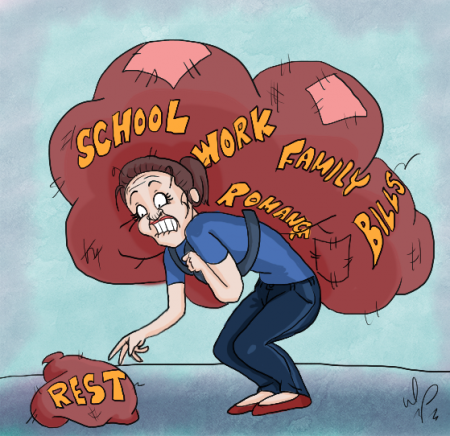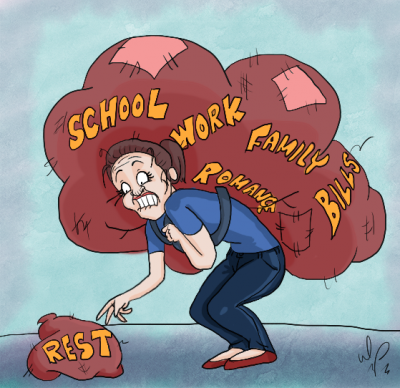| February 5, 2020 | Editorial |
|---|

Going above and beyond in school and in the professional world is often highly valued in the U.S. workplace culture and academic settings. But “workaholism” harms students and professionals by promoting the idea that endless hours working for higher profits or lots of studying for top grades are desirable.
Changing values in today’s society have shifted that mindset from continuously working and studying to achieve success in maintaining a balance between work and play.
Although constantly connecting through texting and social media is a relatively new phenomenon, it has now firmly rooted itself in the U.S. social fabric. A change towards slowing down and unplugging is becoming more acceptable.
There is certainly value in hard work and high grades. Still, tedious busy work and endless hours of useless homework exercises drain the energy of all students with repetitive tasks that don’t benefit them.
Copious homework assignments and mandatory reading for students start as early as elementary education in the U.S. in an attempt to keep up with standardized testing.
Maintaining perspective in regards to student’s grades needs to be relaxed from rigid standards of achievement. Learning from one’s classes is the true gift of education, not high marks on a report card.
Graduating from high school or college doesn’t mean the grind ends. Employers and businesses embrace the capitalistic standard of working hard. Although that work ethic has spawned plenty of success, work/life balance can fall by the wayside.
Bosses who regularly ask their employees to work overtime are not always the problem. Sometimes, some extra work and extra pay are fine for everyone involved. Way too many working professionals end up bringing their work home. In essence, more homework.
Laptops, cell phones and remote working setups facilitate an ability to work from home but also open the door to working after hours. Establishing a habit of working beyond what is normally expected can lead to decreased productivity due to fatigue.
Burnout is real. A couple of pages left to read, a few more lines to write or just a couple more emails to send before calling it quits for the day can all contribute to excessive exhaustion.
Working conditions within the U.S. fluctuate throughout history. There were times when 8-year-olds worked in factories, and 80-hour-a-week workdays were totally normal. Now, we have many more workplace regulations in place to allow for less crazy and dangerous work schedules.
A long work week means less time spent with workers’ own families, hobbies and other needs. The U.S. stands in stark contrast with other nations in providing paid parental leave for both mothers and fathers, as it does not have a national paid parental leave benefit.
This simply illustrates that many times work productivity is valued over workers’ leisure time. Free time is disappearing.
Since employees don’t often have control over these types of scenarios, it is important to schedule downtime and self-care nonetheless. Caring for oneself is crucial.
Workplace cultures that promote wellbeing and proactive care are becoming more popular for workers. Working and studying like crazy and burning the candle at both ends is not recommended.
Being self-disciplined is essential to success, and sometimes pushing harder than normal is needed and encouraged.
However, taking time to unwind, separate ourselves from our work or academics and recharge must occur to maintain a healthy existence. These factors greatly impact success on any level for any person in any stage of life.
People have enough to worry about these days without compounding the issue by overworking themselves. In this economy, almost all adults must either work or pursue academic endeavors to survive and thrive in this world.
The need to overwork and wear ourselves out is too easily accepted in U.S. culture. Be the change this world needs, take a nap and maintain your hobbies!



































